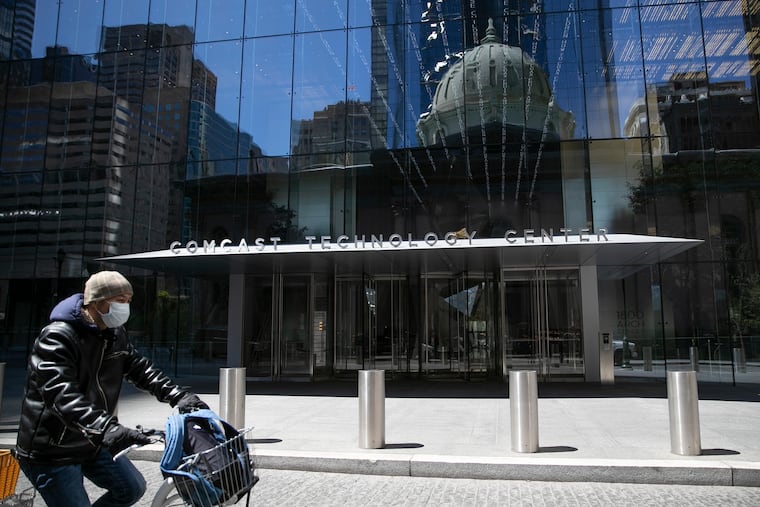Comcast must open Wi-Fi networks to get 20,000 Philadelphia students online | Opinion
Comcast, which calls Philadelphia home and has made literally billions of dollars with support from taxpayers, is turning its back on the city and its children.

If there were villains in Philadelphia’s COVID-19 nightmare, Comcast would be right up there with Joel Freedman, owner of the shuttered and unused Hahnemann Hospital.
About 20,000 Philadelphia students without internet connections have been unable to attend school for months, and yet, when asked directly by Dr. Hite, Superintendent of the School District of Philadelphia, to open their residential Wi-Fi networks so students could actually use the more than 80,000 laptops distributed by an already fiscally underwater school district, Comcast refused.
Comcast received a $12.7 billion tax gain due to the Trump tax bill back in January 2018.
Comcast received $18 million in tax allowances from Pennsylvania from 2007 through 2012.
Comcast received a 20% property tax cut in the past from Philadelphia, the poorest big city in America.
Comcast recorded a net profit of $94.5 billion in 2018.
Comcast CEO, Brian Roberts, who attempted to buy off the people’s goodwill with a $5 million donation for student laptops, was earning nearly $30 million a year as of 2018 and is personally worth $1.8 billion.
Comcast claims their networks were not engineered for public use. But according to a letter written by U.S. Senators, including Cory Booker and Kamala Harris: “millions of Comcast’s customers pay the company $14 a month to rent a Wi-Fi router which includes, by default, a Comcast-controlled public Wi-Fi network to which Comcast sells access.” Not only does Comcast have the capability to use their networks for public use, but the infrastructure is also literally already in people’s homes.
» READ MORE: Philly schools chief says internet providers refuse to open their networks so students can access education
While Comcast is proud of its Internet Essentials package, the $10 monthly fee pays for internet speeds that are “slower than 89 percent of cable connections in the U.S,” per a Roosevelt Institute report. Furthermore, for eligible families who were already living in poverty and are now—with 38 million Americans unemployed—likely on the brink of economic catastrophe, $10 is hardly a small amount of money. Nevertheless, desperate families are willing to pay what they must for internet access in times of crisis. For this reason, skeptics like those at Roosevelt decry Comcast’s supposedly philanthropic program as merely a “customer acquisition program in disguise.”
Comcast further seems to believe that their outdoor and small business hotspots are satisfactory options for families without home internet access. The tone-deafness of this belief is staggering, particularly since the children of Comcast executives do their schoolwork from their homes using their own home Wi-Fi, while less privileged families have to make do with the nearest parking lot. It sounds Dickensian, but this is not hyperbole. Enough students have been forced to complete their studies in parking lots that the Philly Tech Justice activist group created the #ParkingLotWiFi campaign to shine a light on these gross inequities.
The bottom line is the Comcast, which calls Philadelphia home and has made literally billions of dollars with support from Philadelphia taxpayers, is turning its back on the city and its children.
Here is what Comcast needs to do:
Make all Xfinity hotspots, including residential hotspots, free to the public starting now until 60 days after virtual schooling has ceased.
Make the Internet Essentials program free from the time of enrollment until 60 days after virtual schooling has ceased.
Permanently increase the Internet Essentials upload speed from 3 Mbps to 25 Mbps and download speed from 25 Mbps to 100 Mbps.
Until then, Comcast is nothing more than another greedy corporate conglomerate, valuing the almighty dollar more than the education of Philadelphia’s children.
Zachary Wright is an education activist with the brightbeam network and an assistant professor of practice at Relay Graduate School of Education serving Philadelphia and Camden. A 2013 Philadelphia Outstanding Teacher of the Year, Wright formerly taught 12th-grade world literature and AP literature at Mastery Charter School Shoemaker Campus, Philadelphia.
The Philadelphia Inquirer is one of more than 20 news organizations producing Broke in Philly, a collaborative reporting project on solutions to poverty and the city’s push toward economic justice. See all of our reporting at brokeinphilly.org.